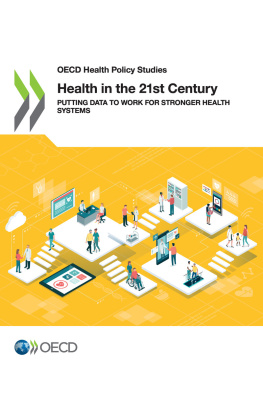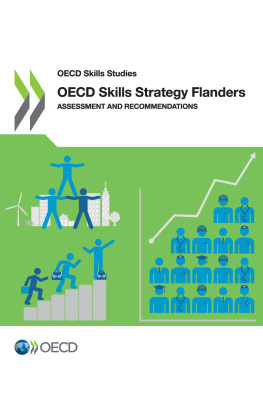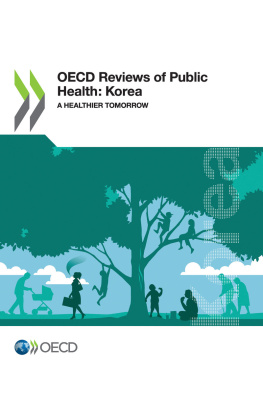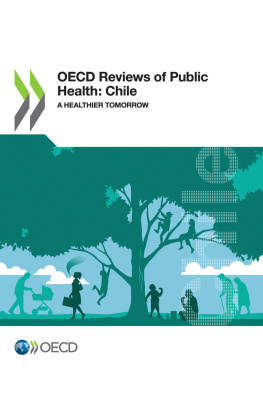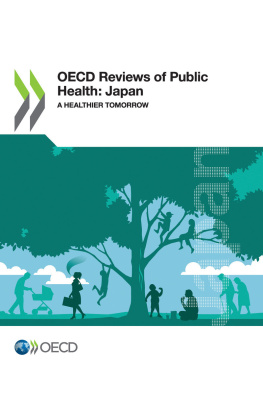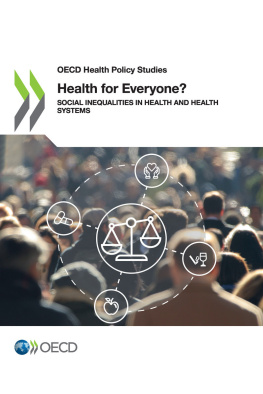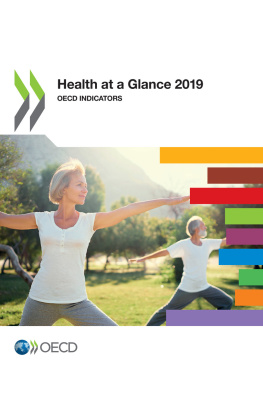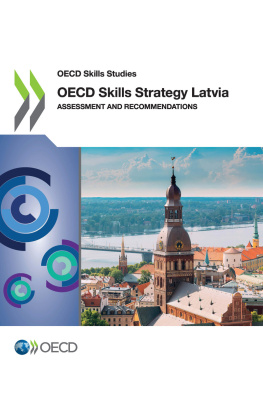OECD - Health in the 21st Century
Here you can read online OECD - Health in the 21st Century full text of the book (entire story) in english for free. Download pdf and epub, get meaning, cover and reviews about this ebook. year: 2019, publisher: OECD Publishing, genre: Politics. Description of the work, (preface) as well as reviews are available. Best literature library LitArk.com created for fans of good reading and offers a wide selection of genres:
Romance novel
Science fiction
Adventure
Detective
Science
History
Home and family
Prose
Art
Politics
Computer
Non-fiction
Religion
Business
Children
Humor
Choose a favorite category and find really read worthwhile books. Enjoy immersion in the world of imagination, feel the emotions of the characters or learn something new for yourself, make an fascinating discovery.
Health in the 21st Century: summary, description and annotation
We offer to read an annotation, description, summary or preface (depends on what the author of the book "Health in the 21st Century" wrote himself). If you haven't found the necessary information about the book — write in the comments, we will try to find it.
OECD: author's other books
Who wrote Health in the 21st Century? Find out the surname, the name of the author of the book and a list of all author's works by series.
Health in the 21st Century — read online for free the complete book (whole text) full work
Below is the text of the book, divided by pages. System saving the place of the last page read, allows you to conveniently read the book "Health in the 21st Century" online for free, without having to search again every time where you left off. Put a bookmark, and you can go to the page where you finished reading at any time.
Font size:
Interval:
Bookmark:
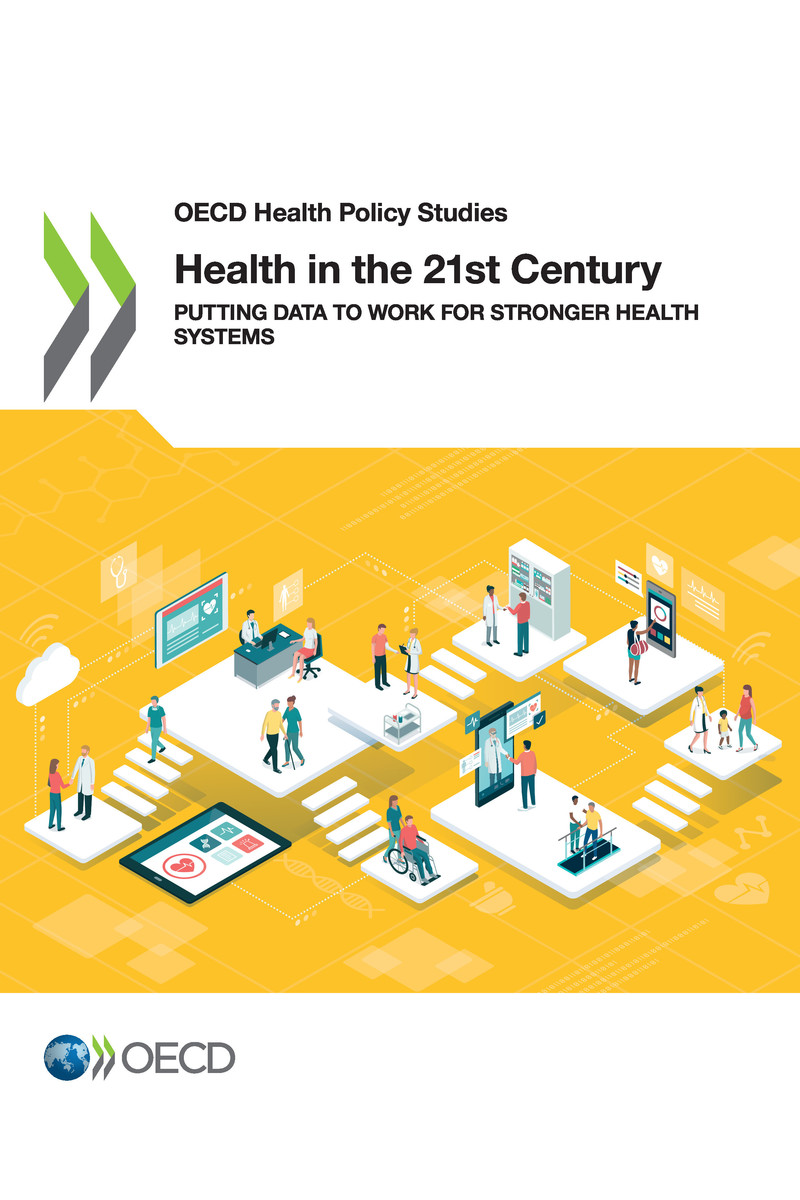
OECD (2019), Health in the 21st Century: Putting Data to Work for Stronger Health Systems , OECD Health Policy Studies, OECD Publishing, Paris, https://doi.org/10.1787/e3b23f8e-en .
In the past thirty years, digital technology has transformed entire societies and the global economy. The extent of this transformation can be compared to previous industrial revolutions.
The essential element of digital transformation is not smartphones, software, or even the internet. It is electronic data. Digital technology is a way of creating, managing, sharing and analysing data to provide the right information to the right person at the right time. Its inherent qualities mean that this can be done extremely quickly, efficiently and at very low incremental cost. Unsurprisingly, a wide range of sectors have harnessed these unique characteristics to transform their business practices, delivering considerable consumer surpluses and social dividends.
But two decades into the 21 st century, and a similar transformation is yet to occur in health. Despite rapid digitalisation and immense opportunities in an industry where information and communication are so intrinsic to success and failure, the health sector remains data rich but information poor.
This report examines how OECD countries are leveraging data and digital technologies to achieve their health policy objectives, and how a digital transformation can help to address existing and emerging policy challenges. It continues a work programme that began in 2010, when Health Ministers asked the OECD to examine how electronic data can be put to work to improve health services, research and policy making. This work has produced several reports, culminating in the Recommendation of the OECD Council on Health Data Governance . Health Ministers welcomed the Recommendation at their subsequent meeting in 2017, where they also instructed the OECD to continue examining this topic with a focus on identifying the key barriers and enablers of a digital transformation in health.
The report finds that despite some promising signs and isolated successes, health is a long way behind other sectors. While a digital transformation is not an end in itself, it provides clear opportunities to build effective, equitable, people-centred and efficient health systems. These opportunities are currently being wasted. The report emphasises that a digital transformation does not happen spontaneously. It relies on fundamental organisational change. In health, this means overhauling the structures, policies and institutions that govern how systems function. These institutions pre-date the digital era and are notoriously resistant to change. In some ways, the arrival of digital technology has served to highlight the same problems that have stood in the way of meaningful reform for a long time.
A digital transformation is a therefore a political choice. It relies on leadership and bold policy decisions. It requires investment that, if targeted well, can deliver considerable returns. Above all, it is an opportunity to finally address several fundamental and long-standing deficiencies in the health sector, and bring health into the 21 st century for the benefit individuals, communities and societies.
Preparing this report was a joint effort by a team of authors from OECD Health Division. The work was co-ordinated by Luke Slawomirski and Martin Wenzl, who also authored several chapters. Other authors were Elina Suzuki, Karolina Socha-Dietrich, Jillian Oderkirk and Cristina Gall (an external consultant).
The team would like to acknowledge and warmly thank the country delegates of the OECD Health Committee and country experts for their responses to the policy survey, comments on the draft chapters, and suggestions at various stages of the project. Special thanks go to the topic experts who gave their time for telephone interviews.
Within the OECD Directorate of Employment, Labour and Social Affairs (ELS), the authors wish to thank Stefano Scarpetta, Mark Pearson, Francesca Colombo, Frederico Guanais, Valrie Paris and Ruth Lopert who provided valuable comments and viewpoints. Thanks also to Jens Wilkens and Peter Wyckoff, both formerly with the ELS Directorate, who contributed to the development of Chapter 8 and Chapter 4 respectively. Many thanks go to Lucy Hulett and the ELS communications team for their editorial support, and in the design and production of the report. The team would also like to thank Duniya Dedeyn, Lukasz Lech and Isabelle Vallard for their administrative support throughout the project. Thanks also to Paul Gallagher who helped sharpen the key messages from the work.
Font size:
Interval:
Bookmark:
Similar books «Health in the 21st Century»
Look at similar books to Health in the 21st Century. We have selected literature similar in name and meaning in the hope of providing readers with more options to find new, interesting, not yet read works.
Discussion, reviews of the book Health in the 21st Century and just readers' own opinions. Leave your comments, write what you think about the work, its meaning or the main characters. Specify what exactly you liked and what you didn't like, and why you think so.

